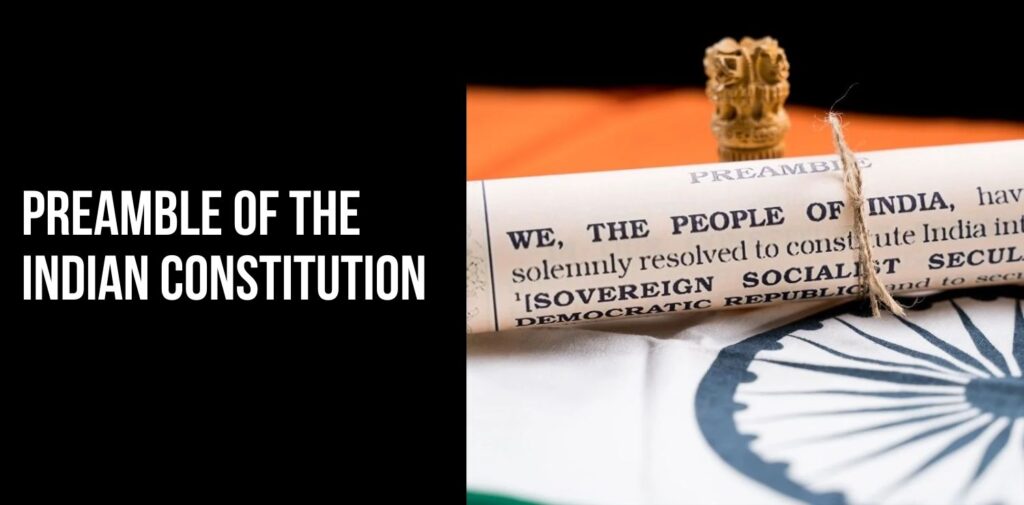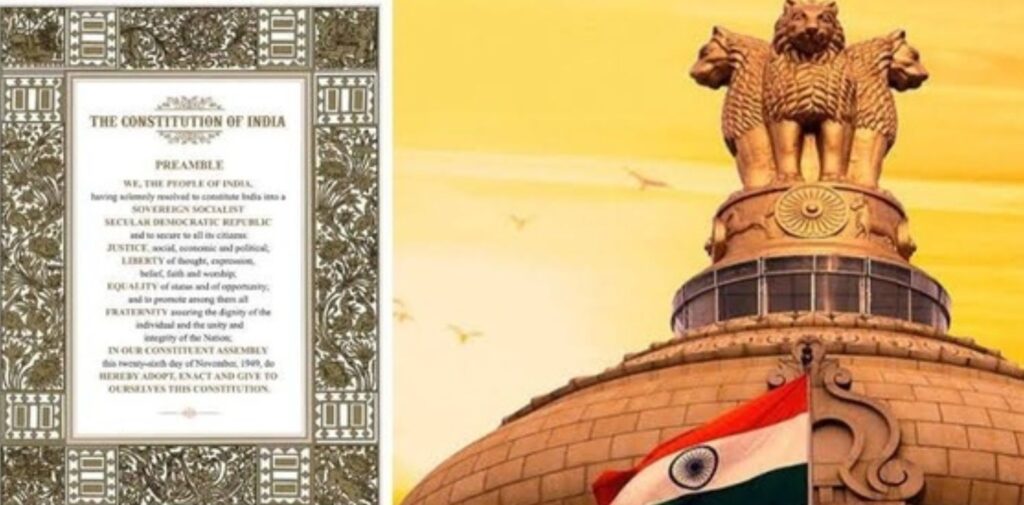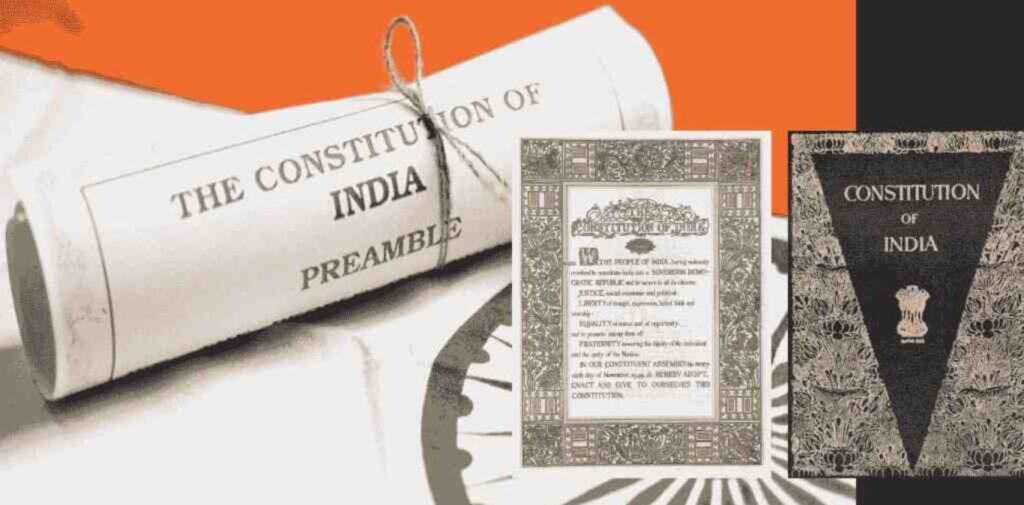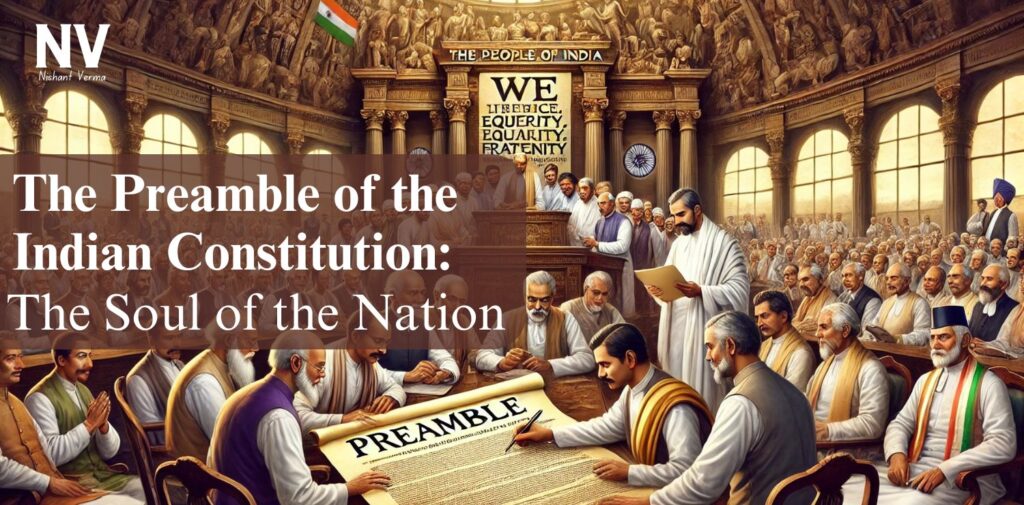The Preamble of the Indian Constitution is one of the most significant and foundational elements of India’s democratic framework. It serves as an introduction to the Constitution and lays down the guiding principles and values upon which the Republic of India is built. The words in the Preamble hold deep meaning and reflect the aspirations of the Indian people. By studying it closely, we can better understand the ideals and vision of India as a nation.
What is the Preamble?
The Preamble is the opening statement of the Indian Constitution. It outlines the philosophy and goals behind the Constitution and describes the vision for the country. The words are concise, yet powerful enough to reflect the principles that guide the country’s governance and legal framework. The Preamble is often referred to as the “soul” of the Constitution because it captures the essence of India’s political system and the values that form the bedrock of the nation.

The Preamble reads:
“We, the people of India, having solemnly resolved to constitute India into a Sovereign, Socialist, Secular, Democratic Republic and to secure to all its citizens:
Justice, social, economic, and political; Liberty of thought, expression, belief, faith, and worship; Equality of status and of opportunity; Fraternity assuring the dignity of the individual and the unity and integrity of the Nation;
In our Constituent Assembly this 26th day of November, 1949, do hereby adopt, enact, and give to ourselves this Constitution.”
Breaking Down the Preamble
To understand the significance of the Preamble, let’s break it down and explore the key terms and ideas it presents:
- “We, the people of India”: This opening line is powerful because it emphasizes the democratic nature of the Indian state. It means that the Constitution derives its authority not from any king, ruler, or external force but from the collective will of the people of India. The phrase highlights that the Constitution was not imposed on the people; rather, it was a document created by them, for them.
- Sovereign: Sovereignty refers to the supreme authority of the nation to govern itself without interference from external forces. When India became independent on August 15, 1947, it was freed from British colonial rule, but it still needed to establish its own sovereign status. The Preamble declares India as a “Sovereign” nation, meaning that it has full control over its territory, laws, and governance, and is not subject to any foreign influence or control.
- Socialist: The term “socialist” in the Preamble reflects India’s commitment to social equality and the eradication of economic disparities. It signifies the country’s goal to provide equal opportunities for all citizens, reduce wealth gaps, and ensure that resources are distributed in a way that promotes social justice. Although the specific approach to socialism in India has evolved over time, the Preamble’s inclusion of socialism aims to build a fair and just society where economic and social inequalities are minimized.
- Secular: India is described as a “secular” state, which means that the government does not favor any religion over another. It respects all religions and ensures that people of all faiths are free to practice their religion without discrimination. Secularism in India is a cornerstone of its democracy, as it protects the religious diversity of the country, allowing people to live in harmony regardless of their religious beliefs.
- Democratic: India is a “democratic” republic, meaning that the people of India have the power to elect their leaders. The democratic nature of India ensures that the government is accountable to the people, who elect representatives through regular, free, and fair elections. This principle guarantees the right of every citizen to participate in the political process, ensuring that power is vested in the hands of the people.
- Republic: The term “Republic” means that the head of state in India is not a hereditary monarch but an elected representative. In India, the President is the head of state, and the President is elected by an electoral college, ensuring that the position is open to any citizen, not just those born into certain families. This reflects India’s rejection of monarchical rule and its commitment to a government chosen by the people.

The Objectives of the Preamble
The Preamble also sets out the objectives that the Constitution aims to achieve for the people of India. These objectives can be understood through the terms mentioned after “to secure to all its citizens”:
- Justice – Social, Economic, and Political: The first goal of the Preamble is to ensure justice for all citizens in social, economic, and political spheres. This means:
- Social Justice: Equal treatment for all citizens, irrespective of their caste, creed, or background. It includes the protection of the rights of marginalized and disadvantaged groups.
- Economic Justice: Fair distribution of wealth and resources to reduce inequality and poverty. It promotes economic opportunities for all citizens.
- Political Justice: Ensuring equal participation in the political process and giving all citizens the opportunity to engage in the country’s governance.
2. Liberty of Thought, Expression, Belief, Faith, and Worship: Liberty is a fundamental principle in the Constitution. The Preamble guarantees the freedom of individuals to think freely, express their opinions, and practice their religion of choice. This ensures that citizens can voice their opinions, engage in discussions, and make their beliefs known without fear of repression. The freedom of worship allows people to follow any religion or none at all, contributing to India’s pluralistic society.
3. Equality of Status and Opportunity: Equality is a cornerstone of the Indian Constitution. This phrase emphasizes that every citizen, regardless of their gender, caste, or social status, should have the same opportunities to succeed in life. It ensures that there is no discrimination, and everyone is treated with fairness and dignity.
4. Fraternity Assuring the Dignity of the Individual and the Unity and Integrity of the Nation: Fraternity refers to a sense of brotherhood among all the people of India. The Preamble stresses the importance of maintaining the dignity of each individual while also ensuring the unity and integrity of the nation. India is a land of diverse cultures, languages, and religions, and fraternity fosters respect and harmony among all sections of society. It also ensures that every individual is treated with dignity and respect.

Significance of the Preamble
The Preamble holds immense significance as it provides the moral compass for interpreting the Constitution. Here are some reasons why the Preamble is important:
- A Vision for the Future: The Preamble lays down a vision for India’s future—a country where justice, liberty, equality, and fraternity are guaranteed for all. It serves as a guide for lawmakers, judges, and citizens to understand the aspirations that the country is meant to uphold. The ideals expressed in the Preamble are a source of inspiration and motivation for India’s ongoing journey toward becoming a more inclusive and equitable society.
- A Source of Interpretation: While the Preamble itself is not enforceable in a court of law, it is often used by judges to interpret the Constitution. The Supreme Court of India has referred to the Preamble in several landmark cases to understand the intent of the framers of the Constitution and to ensure that laws align with the fundamental values of the nation. For example, the concept of “social justice” has been frequently invoked to strike down laws that discriminate against certain groups.
- Unity in Diversity: India is a diverse nation with multiple religions, cultures, and languages. The Preamble’s emphasis on “unity and integrity” fosters a sense of common identity and belonging among Indians. It reassures citizens that despite their differences, they are united by shared principles of justice, liberty, and equality.
- A Commitment to Democracy: The Preamble reflects India’s unwavering commitment to democracy. It affirms that sovereignty lies with the people and that they have the power to shape the nation’s future through their vote and participation in governance. It is a constant reminder that India is a democratic republic, and power remains in the hands of its citizens.
Conclusion: The Preamble of the Indian Constitution
The Preamble of the Indian Constitution is not just a formal introduction but the very soul of the document. It encapsulates the aspirations of the Indian people and sets the direction for the nation. With its emphasis on justice, liberty, equality, and fraternity, the Preamble remains a beacon for India’s democracy and governance. By adhering to the principles outlined in the Preamble, India continues to strive toward a more inclusive, fair, and just society.




